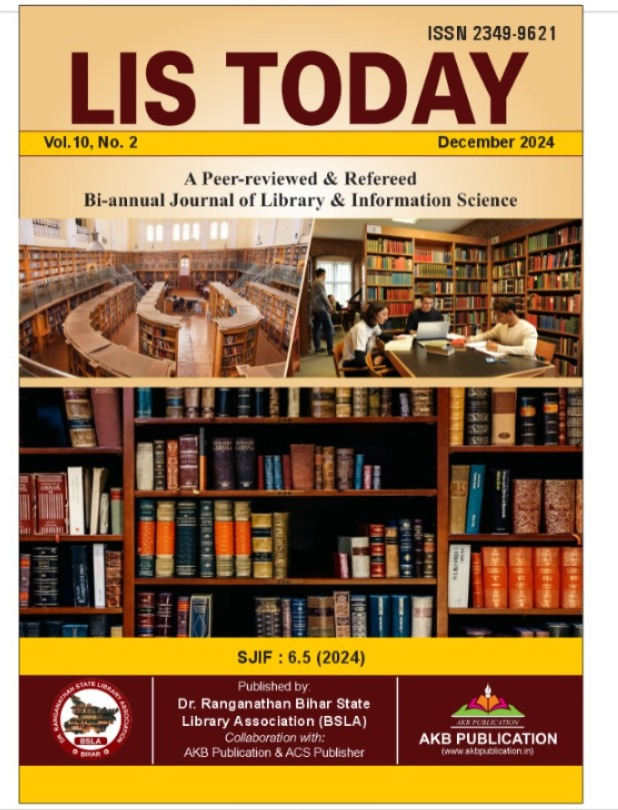A Bibliometric Analysis of Indian Research on Quality Education (2005- 2024): Trends, Impact, and Future Directions
DOI:
https://doi.org/10.48165/lt.2025.11.1.6Keywords:
Quality Education, Bibliometric Analysis, Indian Research, Research Trends, Higher EducationAbstract
This study examines research trends on quality education in India from 2005 to 2024 through bibliometric analysis, addressing the lack of a comprehensive understanding of Indian research output in this critical area. Key aspects analyzed include publication trends, leading authors, thematic areas, influential institutions, and prominent sources. Data extracted from the Scopus database on November 22, 2024, yielded 654 publications, analyzed using MS Excel and Bibliometrix R software. Findings reveal a notable rise in publications, especially post-2020, with peaks in 2023 and 2024. Authors like Raghu Raman and Priyadarshini Dey, along with institutions such as the University of Delhi and Christ University, emerged as significant contributors. Dominant themes include social sciences, computer science, and engineering, while popular keywords such as “quality education” and “e-learning” reflect emerging trends. The study offers actionable insights for policymakers, educators, and researchers to enhance collaborations, address research gaps, and support sustainable educational development.
References
Syahrial, S., et al. (2024). Bibliometric study and visualization of research trends in cultural heritage. AIP Conference Proceedings, 3065(1), 030032. https://doi.org/10.1063/5.0227429
Aria, M., & Cuccurullo, C. (2017). Bibliometrix: An R-tool for comprehensive science mapping analysis. Scientometrics, 111(2), 553–571. https://doi.org/10.1007/s11192-017-2281-1
Saeidnia, H. R., et al. (2024). Unleashing the power of AI: A systematic review of cutting-edge techniques in AI-enhanced scientometrics, webometrics, and bibliometrics. arXiv Preprint. https://arxiv.org/abs/2403.18838
Asadullah, M. N., et al. (2024). Critical perspectives at the midpoint of Sustainable Development Goal 4: Quality education for all—progress, persistent gaps, problematic paradigms, and the path to 2030. https://en.wikipedia.org/wiki/M_Niaz_Asadullah
Bandyopadhyay, S. (2019). Experiential learning models and their impact on knowledge retention in technical education. Journal of Applied Research in Higher Education, 11(2), 402–415. https://doi.org/10.1108/JARHE-03-2018-0032
Donthu, N., et al. (2021). How to conduct a bibliometric analysis: An overview and guidelines. Journal of Business Research, 133, 285–296. https://doi.org/10.1016/j.jbusres.2020.06.057
Mitha, S. B., & Omarsaib, M. (2024). Emerging technologies and higher education libraries: A bibliometric analysis. Library Hi-Tech. https://www.emerald.com/insight/content/doi/10.1108/lht-02-2024-0105/full/html
Engida, M. A., Iyasu, A. S., & Fentie, Y. M. (2024). Impact of teaching quality on student achievement: Student evidence. Frontiers in Education, 9, 1367317. https://doi.org/10.3389/feduc.2024.1367317
Wu, D., et al. (2024). A bibliometric and visualization analysis of research trends and hotspots on targeted therapy for breast cancer from 2003 to 2022. Frontiers in Oncology, 14, 1366900. https://doi.org/10.3389/fonc.2024.1366900
Glänzel, W. (2015). Bibliometric methods for detecting and analyzing emerging research topics. Scientometrics, 103(2), 311–331. https://doi.org/10.1007/s11192-015-1581-7
Kumar, R., Mishra, R., & Yadav, P. (2021). The role of ICT-based tools in enhancing education quality in rural India. Computers & Education, 163, 104015. https://doi.org/10.1016/j.compedu.2020.104015
Kumar, S., & Sharma, D. (2020). Challenges of adopting digital education in rural areas: Infrastructural and socio-economic constraints. Scientometrics, 124(2), 543–559. https://doi.org/10.1007/s11192-020-03423-2
Kumar, S., & Sharma, R. (2020). Impact of digital learning tools on education: A bibliometric review. Scientometrics, 123(3), 1351–1368. https://doi.org/10.1007/s11192-020-03423-2
Mishra, S., & Kumar, S. (2019). A bibliometric study of library and information science research in India. DESIDOC Journal of Library and Information Technology, 39(4), 205–212. https://doi.org/10.14429/djlit.39.4.14963
Mukherjee, P. (2022). Addressing the urban-rural divide in educational outcomes in India. DESIDOC Journal of Library and Information Technology, 42(1), 21–35. http://publications.drdo.gov.in/ojs/index.php/djlit/article/view/1720
Nagarajan, R., & Meera, K. (2020). Sustainable development goals research in SCOPUS: A bibliometric analysis. Scientometrics, 125(2), 1231–1250. https://doi.org/10.1007/s11192-020-03412-5
National Education Policy. (2020). Ministry of Education, Government of India. https://www.education.gov.in/sites/upload_files/mhrd/files/NEP_Final_English.pdf
Patel, V., Jain, M., & Singh, T. (2020). Industry-academia partnerships for skill development: A systematic review. International Journal of Educational Management, 34(2), 367–380. https://doi.org/10.1108/IJEM-09-2019-0337
Rao, K. R. (2020). Trends in research productivity of Indian institutions in higher education. Scientometrics, 122(4), 1859–1882. https://doi.org/10.1007/s11192-020-03411-6
Rao, S. K., Gupta, R., & Jain, A. (2020). Institutional collaborations in Indian educational research: Aligning with national priorities. Scientometrics, 122(3), 671–689. https://doi.org/10.1007/s11192-020-03411-6
Chand, S. P. (2024). Bridging the gaps in quality education. The Educational Review, USA, 8(2), 202–210. https://www.researchgate.net/publication/379000813_Bridging_the_Gaps_in_Quality_Education
Sharma, D., Jain, P., & Gupta, A. (2021). Remote learning during COVID-19: An Indian perspective. Studies in Higher Education, 46(4), 715–728. https://doi.org/10.1080/03075079.2021.1900785
Sharma, P., Singh, A., & Choudhary, R. (2021). Adaptive learning technologies for personalized education: A bibliometric analysis. Studies in Higher Education, 46(8), 1573–1592. https://doi.org/10.1080/03075079.2021.1900785
Mhlanga, D., & Dzingirai, M. (2024). Bibliometric study on organizational resilience: Trends and future research agenda. International Journal of Corporate Social Responsibility, 9(1), 9. https://doi.org/10.1186/s40991-024-00098-8
Bernhard, R., et al. (2024). A focus on quality of teaching in schools increases students’ progress of attainment: Evidence from English secondary schools. School Effectiveness and School Improvement, 35(4), 506–530. https://doi.org/10.1080/09243453.2024.2398601
UNESCO. (2015). Education 2030: Incheon Declaration and Framework for Action—Towards inclusive and equitable quality education and lifelong learning for all. UNESCO. https://unesdoc.unesco.org/ark:/48223/pf0000232555

